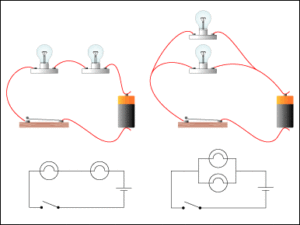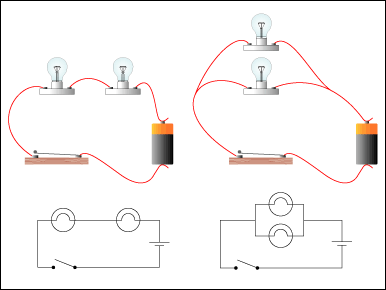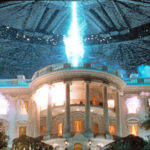The “Alien Work” Of God Part V
So last time, we sat at the foot of the master, C. S. Lewis, and discussed the theological underpinnings of his Space Trilogy. For those of you just joining us now (or who don’t feel like going back and reading the article for yourself), Lewis basically operated under the assumption that each planet was “spiritually” independent of each other, meaning that each planet would have its own Edenic period of testing and, depending on how they dealt with temptation, their own salvation history as well, meaning that for every fallen race, there could potentially be their own incarnation and salvation.
Full disclosure time: I didn’t come up with that list of underpinnings on my own. Back in 1999, when I was attending seminary, I took an elective course called “The Gospel and C. S. Lewis.” I signed up for it on a lark. At that point, the only Lewis I had read was The Screwtape Letters (don’t hurt me!), and I liked it well enough. As part of the course, we read four of the Narnia books, two of the Space trilogy, and Til We Have Faces. During our discussion of the Space trilogy, the professor elucidated the points I shared in my last post. But as we had the discussion, my mind started wandering and I asked myself a fateful question:
What if Lewis got it backwards? What if all the sentient races fell with Adam and Eve at the same time?
I was stunned. Could that be the way it worked? Since the Bible doesn’t speak of aliens, we couldn’t say with any certainty, but one passage in particular seemed to point in that direction. I’m speaking of Romans 8:19-23, which states that all of creation fell with Adam and Eve and now waits for salvation to come to them. I wondered if maybe that would include sentient alien life as well.
That got me to thinking about electricity. I don’t know much about it, but I do remember this from my time in 4H that when you’re wiring up two light bulbs to the same power source, there are two ways to do it, either in a parallel or a series circuit. To wit:
 The circuit on the left is a series circuit, the one on the right a parallel circuit. They behave differently. For example, in the parallel circuit, if one light bulb burns out, the other one will still remain lit because they have independent paths to the battery. But in the series circuit, if one bulb blows, they both go dark. Think Christmas tree lights.
The circuit on the left is a series circuit, the one on the right a parallel circuit. They behave differently. For example, in the parallel circuit, if one light bulb burns out, the other one will still remain lit because they have independent paths to the battery. But in the series circuit, if one bulb blows, they both go dark. Think Christmas tree lights.
So I got to wondering, if there are multiple “light bulbs” in the universe and since humanity has gone dark, what happened to the other races (assuming there are other races out there)? Did God create us all as a parallel circuit or a series circuit? In Lewis’s trilogy, he operated under the assumption that we would exist in parallel with each other. In my thought exercise, influenced by the Romans passage, I wondered if maybe it was the other way around. When one race fell, did we all fall?
If that’s the case, then the redemptive work of Christ is not just for human beings but happened to “replace our burnt out bulb,” so to speak, and allow the other races to find the one true Light as well. In the same way that Christ died for all sinful humanity (and not just the Jews and the Romans who were involved with His crucifixion), Christ died for all living and sentient races.
I further asked myself what would happen with those other races. One moment, they’re living in idyllic paradises specific to their races. The next, sin and death and darkness would break upon them, just as it did for humanity. What would they think? What would they do? What would they . . .
And suddenly, I had a book idea brewing. But that’s another story for another time. Maybe I’ll tell it when we’re done with this series.
Now I realize what some of you might be thinking. “How is that fair? The alien races didn’t sin! They didn’t do anything wrong! How could God let them fall?” But, if you think about it, a lot that we see about sinful humanity isn’t “fair” from our perspective. Think about it this way: is it fair that original sin afflicts all of us, so many millennia later, when we weren’t the ones in the Garden?
So is this the way it works? I have no idea. Maybe. Could be. The only way we’ll find out is if we ever do encounter alien life out there. But in the meantime, it’s good for us to remember that there are plenty of people in this world who Christ definitely died for, people who need to hear that message still to this day.
You know, maybe that’s the take-away for this series. It’s a lot of fun to dance on the end of tree branches, but what’s really important is how our theological rubber hits the road. Before we get too wrapped up in the hypotheticals, let’s keep in mind the actual people around us who are, at this time, aliens to God, lost and foreign. Let’s focus on bringing God’s grace to them.
Now that would be a great way to cap this series, right? That’s exactly why I’m not doing that yet. Instead, I want to spend at least one more week talking about a two book series that kind of/sort of tackles this very issue. So stay tuned, folks.










































John, I like this post a lot. It’s lucid, and the thinking is logical and Biblical from start to finish.
Maria
Interesting way of thinking of it. I generally don’t like scientific examples, but that was clear enough for even me to get it.
If they’re all sinners, then you have room for eeeeeevil aliens who come to take over the world.
If some are sinless, then you have room for the good, naive aliens from Galaxy Quest who don’t understand that fiction is a lie.
So either way makes for good fiction. 🙂
Hurray! This is exactly how it works in the trilogy I’m writing, and I’ve always feared it was the wrong approach, but your explanation makes perfect sense (as does your cool example!).
My thought, though, is that in order to atone for humankind, Christ needed to be both fully infinite God, and fully human. Wouldn’t he need to be fully God and fully alien if he was to atone for an alien people outside of Adam’s race?
That’s a valid question, one that I never really tackled when I was writing my trilogy about the same subject (don’t worry, it’s been shelved indefinitely; long story). If humanity were ever to encounter an alien race(s) that seemed to suggest that what I talked about is reality, then I would think we would need to convene a Church Council as of old to discuss the matter.
But off the top of my head, there are one of two ways to answer your question:
1) By becoming human, the Creator incarnated as a creation. Perhaps by doing so, Jesus took on, not just human nature, but the nature of created beings everywhere. It’d be similar to how Jesus’ incarnation as a man also applied to women too (I know that’s not the same as aliens, but as the old trope goes, men are from Mars, women are from Venus).
2) By dying and rising as a human being, Jesus “replaced humanity’s burnt out bulb,” to overuse my analogy, thus allowing the current to flow to the other races as well. The problem is, because the alien races have been “currentless” for so long, they can’t recognize that the power is back. Plus, there’s the sin thing.
Of course, we’re just dancing on the end of a theological tree branch, so I say, “Go for it!” It’ll be fun.
Hmmm, good thoughts. Point 1 is kind of how I’ve been thinking it would work.
In my trilogy, God protected the other world in a way, preserving it the degree of depravity some of the human race has reached. Although they are sinners, their world is collectively more peaceful and has elements of Eden that Earth no longer has (such as the fact that they all speak the same language, because they never had a Babel incident). Most people there have very active consciences. They have an idea of God existing, and acknowledge they were created, but they don’t have any special revelation, although many yearn to know more. They’re essentially waiting for someone from Earth to tell them about the Gospel.
The “currentless” thought is interesting. I guess there would have been a fall moment in their history, but so far back that they don’t remember it. Maybe it coincides with that great global catastrophe I’ve imagined in their history…….
…I’ll stop talking now. 😀 This topic is so endlessly interesting to me, and I love my book, so I could be tempted to go on and on…
Now I’m wondering how the animal kingdom must’ve felt after Adam sinned. All the sudden, if you’re a lamb, wolves are trying to shred and eat you – and you don’t have a clue. I guess that’s when the Good Shepherd stepped in.
I think other created beings inhabiting other worlds would have to be the same kind of beings as us, because we would always fall into the same “category” when compared to angelic beings on the one hand and animals on the other. Considering this, by becoming human, Christ could have taken on the essential nature of all of our “category” of beings, perhaps.
[…] got me on the whole “how do aliens fit into God’s plan of salvation” business was a class I took in the Seminary called “The Gospel and C. S. Lewis.” Long story short, one fall day I sat down and started piecing together an idea. I grabbed two of my […]